Meet Our Alumni
Meet Our Alumni
Olivia Hess
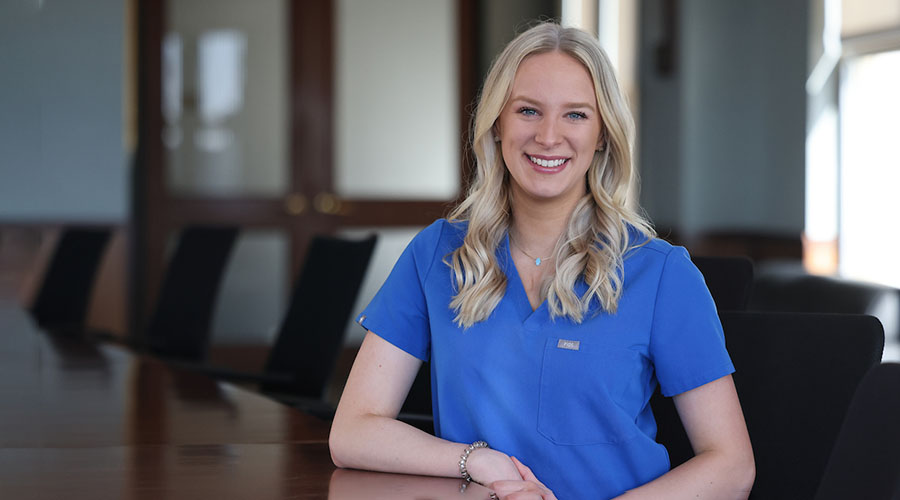
At Suffolk
BS Radiation Therapy, Class of 2022
Since Suffolk
Radiation Therapist, Massachusetts General Hospital (MGH) in Boston
Why did you choose to study Radiation Therapy at Suffolk?
I chose to attend Suffolk’s Radiation Therapy (RT) program because of their affiliation with some of the highest regarded hospitals in the country. I knew I wanted to work in a big hospital setting and was very drawn to Suffolk’s connections. I knew that being a clinical student at these highly advanced and well-known cancer centers would get my foot in the door and help me when the time came to apply for jobs.
How did your Suffolk experience prepare you for your career after graduation?
Suffolk prepared me extremely well to graduate and jump into the field with ample clinical experience and knowledge. I feel Suffolk prepared me very well educationally for the board exam and also as a professional in a clinical setting. Suffolk sets its RT students to a high standard and expects us to graduate as well-rounded Radiation Therapists.
What does a typical day in your job look like?
The schedule at MGH is four 10-hour days per week. My day typically begins at 6am and ends at 4:30pm. I complete morning quality assurance checks on the machine starting at 6am and we take our first patient of the day in for treatment at 7am. I work in the Burr Proton Center at MGH and my machine typically treats 25 patients each day. Each patient has their own customized and specific daily set-up for their treatment, and I am responsible for reproducing the same set-up every day. We use daily x-rays and imaging systems to confirm this. My treatment machine is a team of five therapists and we all work together to treat each patient.
As a Radiation Therapist, I see my patients every single day for a long course of treatment. This gives me the opportunity to really connect with my patients and provide them with compassionate and individualized care. My favorite part of my job is the bond that is formed from seeing my patients daily. It is incredibly rewarding and fulfilling to be a part of my patients’ cancer journey.
William "Bill" Hazeltine
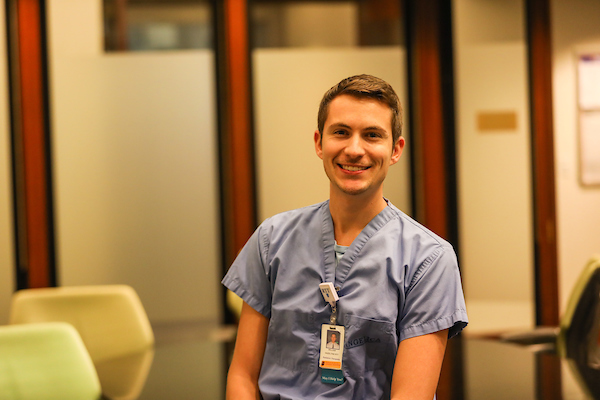
At Suffolk
BS Radiation Therapy, Class of 2012
Since Suffolk
Lead Radiation Therapist, Massachusetts General Hospital in Boston
Why did you choose to study Radiation Therapy?
I always knew from early on that I wanted to pursue a career in healthcare. I was deciding between several different areas of study when my grandmother was diagnosed with Breast Cancer. She received radiation as part of her treatment and shared her experience with me. The Radiation Therapists that treated her helped her through a very difficult time. They were very sensitive to what she was going through and made sure to play her favorite music for every treatment. I decided at that point that I wanted to help people in the same way. I also have always had an interest in physics and after researching the field I knew that this is what I wanted to do.
How did your Suffolk experience prepare you for your career after graduation?
My time at Suffolk provided me with a strong foundation for my career. All of my professors had a passion for teaching and provided encouragement and support. In my final two years at Suffolk, I rotated through several different hospitals as a student working closely with Radiation Therapists. This clinical experience was very challenging, but provided me with the skills necessary to have a successful career as a Radiation Therapist.
What does a typical day in your job look like?
A typical day for me consists of treating a full schedule of radiation therapy patients. We work in teams of 4 and treat patients from 7:00 am to around 5:30 pm. It is also my responsibility to manage our schedule to ensure that our workday runs smoothly. Additionally, I work closely with various Radiation Oncologists and physicists that work in our department. All of the different role groups must work together seamlessly to provide the highest quality care to all of our patients. I am lucky in that a typical day for me consists of working closely with a group of talented and passionate people that truly want to make a difference and impact their patients’ lives in a positive way.
Kathryn Silva
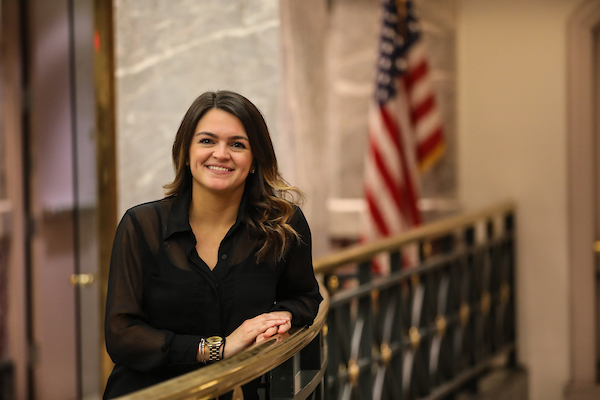
At Suffolk
BS Radiation Science, Class of 2014
Since Suffolk
Current Stem Cell Transplant Coordinator at Dana-Farber Cancer Institute (DFCI) in Boston
Former Clinical Research Coordinator in Breast Oncology at Dana-Farber Cancer Institute in Boston
Why did you choose to study Radiation Science?
I wanted to choose a healthcare-directed major that would give me a specialized focus. I really enjoyed the oncology care aspect of the curriculum, and felt like I gained a broad understanding of not only radiation physics, but also patient care.
How did your Suffolk experience prepare you for your career after graduation?
The instructors were great because they were practicing clinicians and could share their patient experiences in a way that could not be learned in a classroom. The proximity of Suffolk University to Massachusetts General Hospital (MGH) was also a great benefit, as I had the experience of taking a Radiation Physics lab in the Radiation Oncology Simulation suite at MGH.
What does a typical day in your job look like?
My position involves working with healthy and unrelated bone marrow and peripheral blood stem cell donors through the National Marrow Donor Program in conjunction with DFCI, who are requested as a match for a patient/recipient through the global registry. I work to coordinate with donors and bring them in for a physical exam to determine if they are safe and suitable to serve as a stem cell donor. A day in my job involves working with stem cell donors through every step of the donation process. This involves the collection of the stem cell product, whether it's going into the OR with the clinical team during bone marrow harvests early in the morning, or working with the Apheresis Center staff to collect the cells off of the machine as they are filtered. Every day is different and poses a new challenge!
Monica Caggiano
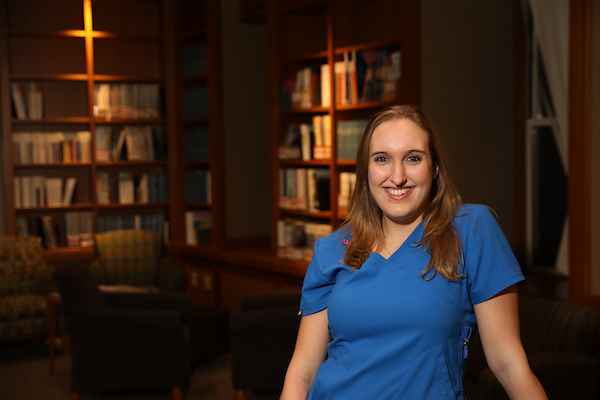
At Suffolk
BS Radiation Therapy, Class of 2016
The Journey Program
Since Suffolk
Radiation Therapist at Beth Israel Deaconess Medical Center in Boston
Why did you choose to study Radiation Therapy?
When I attended an open house at Suffolk University, I spoke to Jessica Mak, the program director of the Radiation Therapy program, and she explained to me the role that a radiation therapist plays in cancer care. At the time, a close family relative recently passed away from an aggressive form of Lung Cancer. I distinctly remember how he told me that the team of therapists taking care of him during his radiation treatments made his experience day to day much easier and even enjoyable. From that moment, I knew that being a Radiation Therapist was the career path for me. I wanted to be able to provide patients going through the hardest time of their life with positive energy and hope. Being a part of curing their cancer is what I wanted to do every day.
How did your Suffolk experience prepare you for your career after graduation?
Suffolk University offers a rigorous program in radiation therapy that includes classroom courses and clinical rotations at some of the largest hospitals in Boston. Outstanding and dedicated professors truly care about preparing you for your career and teaching you the fundamentals of working in healthcare. Not only did I take classes specific to Radiation Therapy, but I also took classes in Psychology and Management to broaden my education. As a radiation therapist you interact with patients all day long and having a background in psychology can help you work effectively with a diverse range of people. Being able to take classes in Suffolk’s Business School also provided me with a unique perspective on the inner workings of businesses and the people who run them.
Suffolk University’s Journey Program was one of the best organizations I became a part of during my time at Suffolk. This four-year program helps you build your leadership skills and teaches you how to work in teams successfully. Overall, I feel like Suffolk not only offered me exceptional academics, but many hands on learning opportunities that helped build interpersonal skills necessary for my career.
What does a typical day in your job look like?
A typical day at my job consists of treating anywhere from thirty to fifty cancer patients a day. Each patient has a specific set up and prescription of radiation that needs to be delivered throughout the course of their treatment. Our department treats a variety of cancers with curative intent, but also offers palliative care. We use Varian Linear Accelerators to effectively deliver external beam radiation to our patients. Brachytherapy procedures are also common forms of High Dose Rate (HDR) treatments preformed in our department. I work in a team that consists of three or four radiation therapists. Within our department, we interact closely with a staff of nurses, physicists, dosimetrists, administration, and doctors.
Steffany (Litch) Williams
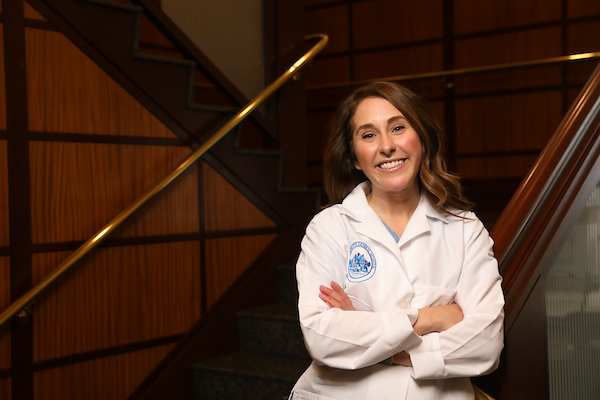
At Suffolk
BS Radiation Therapy, Class of 2012
Internships: Brigham and Williams Hospital in Boston; Massachusetts General Hospital in Boston; Massachusetts General Hospital, Francis H. Burr Proton Center in Boston; North Shore Cancer Center in Danvers, MA; Exeter Hospital in Exeter, NH
Since Suffolk
Radiation Therapist at Massachusetts General Hospital in Boston
Why did you choose to study Radiation Therapy?
I chose to study Radiation Therapy when I was 28 years old after working for 7 years in Corporate Retail Merchandising. I have my Bachelor's degree in Economics from the University of Massachusetts, Amherst. Being in the corporate world at the height of the recession was eye opening to me. I witnessed round after round of layoffs, takeovers, integrations, job description changes, business strategy changes and an overall difficult environment. I remember sitting in a meeting around 10pm one night and hearing someone use the phrase "we're not trying to cure cancer here" and I thought I'd like to go give that a try. My mom passed away from cancer when I was 11 and my dad was a Radiation Therapist for 37 years and loved every single day of his work. I chose to make this career change hoping that I'd also love every single day of work trying to make a positive difference in the lives of people dealing with cancer.
How did your Suffolk experience prepare you for your career after graduation?
Going back to school in my late 20's was a difficult decision and at times felt too overwhelming to even consider. Making that decision was the hardest part of my career change. I took all of the pre-requisites at my local community college and then applied for the program and was accepted. Suffolk's post-baccalaureate program was fantastic. The course work and the clinical rotations were extremely difficult, but it did provide me with the education and confidence that I needed to enter the workforce.
What does a typical day in your job look like?
A typical day can be treating on average 40 patients and would likely be the same patients every day for a long course of treatment. Seeing the same patients for consecutive days allows the therapists to form bonds and really learn about each patient's individual experiences.
Alexandra (Frati) Lord
At Suffolk
BS Radiation Science Class of 2014
Internship: Medical Health Physics, Beth Israel Deaconess Medical Center in Boston
Since Suffolk
Most Recently Medical Health Physics Specialist at Beth Israel Deaconess Medical Center in Boston
Why did you choose to study Radiation Science?
I originally decided to study radiation science because I was interested in getting into the clinical side - Radiation Therapy. A friend of mine was studying it at that time and she just made it out to sound like the perfect match. I started out at Suffolk University as a transfer student which meant that I had a majority of the core credits complete. This meant I got to really dive right into the Radiation Science classes. I immediately felt like “this is it, this is what I was meant to do”. I believe it was my second year at Suffolk where I took one of the classes that had a hands-on requirement. Radiation Physics allowed me to see firsthand the types of things I would be doing as a Radiation Therapist. It was this class where I came to the conclusion that becoming a Radiation Therapist just wasn’t for me. I loved being more in the background. I loved the science behind it all, the physics, and the calculations. I loved the idea of helping people, interacting with them and being a part of their treatment but for some reason I just didn’t get that “at home” feeling. So, I decided to stick with where I was happy. I was always told that if you love what you do, you’ll never work a day in your life! And that’s the type of life I was looking for! I started to do some research and try to find where I think I might fit in. Little did I know I would soon be offered an incredible opportunity for an internship.
How did your Suffolk internship prepare you for your career after graduation?
I remember getting the email from Program Director Jessica Mak’s office saying that all students in Radiation Science had the opportunity for an internship at Beth Israel Deaconess Medical Center in Boston. My eyes lit up and I thought this was it! This is what I had been waiting for. I had been accepted into a round of telephone interviews. This is how I met Jennifer [O’Riorden, a Suffolk alumna who teaches Radiation Biology for the Radiation Science and Therapy program]. After a few rounds of interviews I was given an incredible opportunity to be a part of the BIDMC family. I quickly, almost instantly got that “at home” feeling I had been searching for. My role as an intern at first was to observe all functions of the office. The role of a Medical Health Physicist is so diverse! There are two main aspects to the office. One being the clinical side, and the other being research. On the clinical side I observed iodinations, brachytherapy, and the functions of the dosimetrist. On the research side I was able to see how radiation was used in the labs. How to control it, protect yourself from unnecessary exposure and how to use it safely are just a few to name! On an average day I could be seen in any one of those areas. The internship showed me a different side of Radiation Science I didn’t even know existed. The internship prepared me by strengthening my skills in many areas of the Medical Health Physics world. It taught me the social skills I needed to interact with many different groups of people, for example the President of the hospital, doctors, patients and environmental staff. It also taught me really how to be a team player. Everyone helped each other and everyone played a part. One of the most important things the internship taught me was how important it is to keep learning. Everyone makes mistakes but the key is to learn from them. Do the research and ask the questions!
What does a typical day in your job look like?
As a Medical Health Physics specialist, my role was more geared towards the research side of things. I was responsible for surveying all the research labs and clinical areas for contamination. I was responsible for radioactive waste collection and management. I spent time speaking with and getting to know any and all lab members and ensuring they were using safe practices and comfortable using the materials they were working with. But thanks to the internship I was also able to assist on the clinical side of things as well! Another exciting part of my role allowed me to be a part of an emergency response team. This prepared me for actual response in an emergency situation as well as training others. A typical day for me, put me in any one of those places! That is my favorite part of this field. It is truly so diverse! I could be anywhere at any given time.



